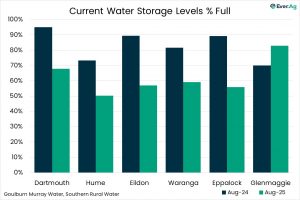
The warnings, predictions and hypotheses about the potential impact of an outbreak of foot and mouth disease in Western Australia are diverse, and at times contradictory.
So what are the facts and are there unique risks for Western Australia?
WA Agriculture and Food Minister Alannah MacTiernan caused a stir this week when she played down fears of a catastrophe if the disease reached the state’s shores, saying it would not stop meat and milk being consumed, and in fact would make the items cheaper.
“I want people to understand this is a serious threat but it is one that we can manage,” she said.
Farmers and agriculture analysts have acknowledged prices would come down initially, as the export market would be shut off completely, therefore creating an oversupply domestically.
But they say it could have the opposite effect in the long term.
“It will inevitably drive people out of the system, and there’ll be less production in the end,” said WA Pastoralists and Graziers Association president Tony Seabrook.
Another factor industry experts warn of is not enough workers to cope with the added domestic production load, if exports stopped.
“We can’t get stock killed as it stands, even now,” Mr Seabrook said.
“There are people that have got stock on their properties that they want to have slaughtered, off the farms and gone, that can’t because of the slowdown in the slaughter capacity due to COVID.”
Agriculture market analyst Matt Dalgleish said there were also far fewer abattoirs in WA than on the east coast of Australia.
If one had to shut down due to contamination, this would again cause a backlog of animals unable to be processed, especially as rules would prevent the transportation of the animals elsewhere.
“Because of the isolation, you’ve got limited options with regards to where you can send these animals if you’ve got part of the supply chain out of action,” he said.
Fears over WA’s proximity to Bali
In a pre-Covid world, the proximity of Bali to Western Australia was often the brunt of jokes, such as dubbing Kuta another suburb of Perth.
But with the discovery of FMD in Indonesia, this geographical closeness has caused some to raise the alarm, with many farmers calling for a complete travel ban between the two countries.
Both the federal and state governments have said this would not be necessary but have stepped up biosecurity measures at airports.
According to experts, while biosecurity measures are needed, returning travellers are not the biggest cause for concern.
“It’s not so much passengers bringing it on their clothing and footwear but the highest risk is through meat products coming in and a lot of that actually comes in through the post,” WA Shadow Agriculture and Food Minister Colin de Grussa said.
An outbreak could occur if contaminated imported produce is fed to livestock.
In all Australian states and territories, it is illegal to feed imported meat, animal and dairy products to pigs. But Veterinarian Olivia Brabant says this is more difficult to police in WA.
“We have quite a lot of pet pigs and backyard livestock in WA and not all of them would be registered,” she said.
Ms Brabant, who lived in the UK as a child during the FMD outbreak there, and still remembers the smell from burning livestock, said the impact this could have on WA should not be underestimated.
“I think it needs to be taken seriously and it needs to be dealt with appropriately,” she said.
WA’s size creates another challenge
Another challenge unique to Western Australia, should the disease get in, is being able to track and eliminate the disease, due to the sheer size of the state.
“As well as other decontamination measures, we’d want to look at secure fencing, which in some parts of WA would be very difficult,” Ms Brabant said.
One thing everyone from farmers to politicians agree on is prevention is the best measure, by stopping FMD from arriving in WA in the first place.
But if their worst fears are realised, analysts say not only would this have a devastating impact on the industry in the short term, it could spell the end to the WA livestock trade as we know it.
“You could see the case where some producers might say ‘well this has provided me with an opportunity to exit out of that sector’,” Mr Dalgleish said.
He said farmers would be tempted to invest the money they received from compensation into crops instead.
Farmers are hoping it doesn’t come to this.
“What we need right now is every single person to be aware of the implications of having it here and doing what they can to make sure it doesn’t come in from overseas, it’s as simple as that”, Mr Seabrook said.
























